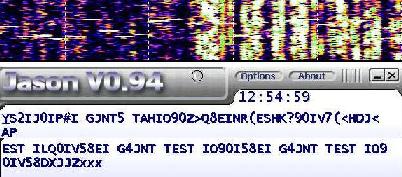Dear LF Group,
I received G4JNT's test signals again last night, and investigated the
sound-card effects a bit further.
I found the difference between the two sound cards was this - one sound
card was fed from the RX audio line output; the QRN crashes were driving
the sound card ADC into saturation at the peaks of the noise. The second
was connected via the headphone socket - the AF gain adjustment was such
that the audio output reached clipping before the sound card was
overloaded. The second sound card gave significantly improved results. So I
played with the gain settings, increasing the RF gain and reducing the
audio gain so that both sound cards were receiving heavily clipped audio at
a level which did not overload the sound card ADC in either computer. This
gave much improved, and equally good results with both sound cards - The
audio coming from the speaker sounded terrible, but the improvement on the
waterfall/Jason displays was remarkable - see the waterfall from SpecLab in
the attachment, where the clipped audio is on the left, and "normal" audio
is on the right of the display. I also found there was some improvement in
going from 300Hz to 1kHz IF BW. The curious thing is that if clipping
occurs before the signal reaches the sound card, the results are better
than if clipping occurs in the sound card - I would expect the effect of
clipping would be similar wherever it occurred between the IF filter and
software FFT algorithm, but apparently not so.
There were thunderstorms nearly overhead while I was receiving the test
signals, but with the gain adjusted for clipped audio as above, the Jason
waterfall was remarkably free of QRN and I was getting perfect copy, even
though there were bright lightning flashes lighting up the room. So I
rotated the loop again to get a marginal signal to compare the
effectiveness of the normal and KK7KA decoders. To get a consistent
comparison, I recorded some .wav files of different signal levels, and then
ran the same file through the different Jason decoders - the results shown
in the attachment are from around 2230utc I think, which was the end of
Andy's transmission (or at least when the signal disappeared from my
screen). The upper decode is produced by the "native" decoder, and is
completely garbled, whilst the lower decode is using the KK7KA decoder, and
contains only a few errors (the last several characters are after the
signal disappeared). The KK7KA decoder seems to give consistently better
decoding with a marginal signal level.
Cheers, Jim Moritz
73 de M0BMU

|

